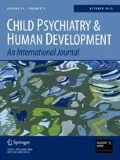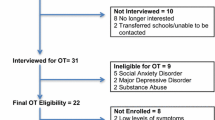Abstract
This study examined the potential benefits of peer-based dyadic interventions for improving the socioemotional functioning of children with ADHD. Participants included children ages 8–12 diagnosed with ADHD-combined type (n = 34) pooled from a larger randomized study comparing peer-based dyadic interventions. Self-concept and depressive symptoms were evaluated at pre- and post-treatment using single group design. Results showed significantly positive child responses to intervention for self-concept. Further, improvements in self-concept were not moderated by the type of dyadic intervention received or by treatment related changes in externalizing behaviors. The severity of reported depressive symptoms, however, did not significantly change. This suggests therapeutic interaction with peers, as demonstrated in peer-based dyadic intervention models, can improve self-concept in children with ADHD even when socioemotional concerns are not a primary target of treatment and independent of behavioral outcomes achieved. These preliminary findings support promoting prosocial peer behavior as a critical domain for ADHD intervention for children.


Similar content being viewed by others
References
Danielson ML, Visser SN, Chronis-Tuscano A, DuPaul GJ (2018) A national description of treatment among United States children and adolescents with attention-deficit/hyperactivity disorder. J Pediatr 192:240-246.e1. https://doi.org/10.1016/j.jpeds.2017.08.040
Xu G, Strathearn L, Liu B et al (2018) Twenty-year trends in diagnosed attention-deficit/hyperactivity disorder among US children and adolescents. JAMA Netw Open 1:e181471. https://doi.org/10.1001/jamanetworkopen.2018.1471
Chronis-Tuscano A, Lewis-Morrarty E, Woods KE et al (2016) Parent–child interaction therapy with emotion coaching for preschoolers with attention-deficit/hyperactivity disorder. Cogn Behav Pract 23:62–78. https://doi.org/10.1016/j.cbpra.2014.11.001
Gaub M, Carlson CL (1997) Behavioral characteristics of DSM-IV ADHD subtypes in a school-based population. J Abnorm Child Psychol 25:103–111. https://doi.org/10.1023/A:1025775311259
Hoza B (2007) Peer functioning in children with ADHD. J Pediatr Psychol 32:655–663. https://doi.org/10.1093/jpepsy/jsm024
Hoza B, Pelham WE, Dobbs J et al (2002) Do boys with attention-deficit/hyperactivity disorder have positive illusory self-concepts? J Abnorm Psychol 111:268–278. https://doi.org/10.1037/0021-843X.111.2.268
McQuade JD, Vaughn AJ, Hoza B et al (2014) Perceived social acceptance and peer status differentially predict adjustment in youth with and without ADHD. J Atten Disord 18:31–43. https://doi.org/10.1177/1087054712437582
Beauchaine TP, Ben-David I, Bos M (2020) ADHD, financial distress, and suicide in adulthood: a population study. Sci Adv 6:eaba1551. https://doi.org/10.1126/sciadv.aba1551
Cuffe SP, Visser SN, Holbrook JR et al (2020) ADHD and psychiatric comorbidity: functional outcomes in a school-based sample of children. J Atten Disord 24:1345–1354. https://doi.org/10.1177/1087054715613437
Humphreys KL, Galán CA, Tottenham N, Lee SS (2016) Impaired social decision-making mediates the association between ADHD and social problems. J Abnorm Child Psychol 44:1023–1032. https://doi.org/10.1007/s10802-015-0095-7
Merrill BM, Molina BSG, Coxe S et al (2020) Functional outcomes of young adults with childhood ADHD: a latent profile analysis. J Clin Child Adolesc Psychol 49:215–228. https://doi.org/10.1080/15374416.2018.1547968
O’Neill S, Rajendran K, Mahbubani SM, Halperin JM (2017) Preschool predictors of ADHD symptoms and impairment during childhood and adolescence. Curr Psychiatry Rep 19:95. https://doi.org/10.1007/s11920-017-0853-z
Park SJ, Jang H, Lee Y et al (2020) Health behaviors, physical health, and health care utilization in children with ADHD. J Atten Disord 24:1011–1019. https://doi.org/10.1177/1087054718775834
Visser L, Linkersdörfer J, Hasselhorn M (2020) The role of ADHD symptoms in the relationship between academic achievement and psychopathological symptoms. Res Dev Disabil 97:103552. https://doi.org/10.1016/j.ridd.2019.103552
Mikami AY (2010) The importance of friendship for youth with attention-deficit/hyperactivity disorder. Clin Child Fam Psychol Rev 13:181–198. https://doi.org/10.1007/s10567-010-0067-y
Mikami AY, Normand S, Hudec KL et al (2020) Treatment of friendship problems in children with attention-deficit/hyperactivity disorder: initial results from a randomized clinical trial. J Consult Clin Psychol 88:871–885. https://doi.org/10.1037/ccp0000607
Mikami AY, Normand S (2015) The importance of social contextual factors in peer relationships of children with ADHD. Curr Dev Disord Rep 2:30–37. https://doi.org/10.1007/s40474-014-0036-0
Dvorsky MR, Langberg JM, Becker SP, Evans SW (2019) Trajectories of global self-worth in adolescents with ADHD: associations with academic, emotional, and social outcomes. J Clin Child Adolesc Psychol 48:765–780. https://doi.org/10.1080/15374416.2018.1443460
McQuade JD, Breslend NL, Groff D (2018) Experiences of physical and relational victimization in children with ADHD: the role of social problems and aggression. Aggress Behav 44:416–425. https://doi.org/10.1002/ab.21762
Mikami AY, Hinshaw SP (2006) Resilient adolescent adjustment among girls: buffers of childhood peer rejection and attention-deficit/hyperactivity disorder. J Abnorm Child Psychol 34:823–837. https://doi.org/10.1007/s10802-006-9062-7
Hoza B, Mrug S, Gerdes AC et al (2005) What aspects of peer relationships are impaired in children with attention-deficit/hyperactivity disorder? J Consult Clin Psychol 73:411–423. https://doi.org/10.1037/0022-006X.73.3.411
Normand S, Schneider BH, Lee MD et al (2011) How do children with ADHD (mis)manage their real-life dyadic friendships? A multi-method investigation. J Abnorm Child Psychol 39:293–305. https://doi.org/10.1007/s10802-010-9450-x
Blachman DR, Hinshaw SP (2002) Patterns of friendship among girls with a without attention-deficit/hyperactivity disorder. J Abnorm Child Psychol 30:625–640. https://doi.org/10.1023/A:1020815814973
Mrug S, Molina BSG, Hoza B et al (2012) Peer rejection and friendships in children with attention-deficit/hyperactivity disorder: contributions to long-term outcomes. J Abnorm Child Psychol 40:1013–1026. https://doi.org/10.1007/s10802-012-9610-2
Dvorsky MR, Langberg JM, Evans SW, Becker SP (2018) The protective effects of social factors on the academic functioning of adolescents with ADHD. J Clin Child Adolesc Psychol 47:713–726. https://doi.org/10.1080/15374416.2016.1138406
Imeraj L, Antrop I, Roeyers H et al (2016) The impact of idle time in the classroom: differential effects on children with ADHD. J Atten Disord 20:71–81. https://doi.org/10.1177/1087054713478464
Mrug S, Hoza B, Pelham WE et al (2007) Behavior and peer status in children with ADHD: continuity and change. J Atten Disord 10:359–371. https://doi.org/10.1177/1087054706288117
Factor PI, Rosen PJ, Reyes RA (2016) The relation of poor emotional awareness and externalizing behavior among children with ADHD. J Atten Disord 20:168–177. https://doi.org/10.1177/1087054713494005
Fussner LM, Luebbe AM, Mancini KJ, Becker SP (2018) Emotion dysregulation mediates the longitudinal relation between peer rejection and depression: differential effects of gender and grade. Int J Behav Dev 42:155–166. https://doi.org/10.1177/0165025416669062
Ostrander R, Crystal DS, August G (2006) Attention deficit-hyperactivity disorder, depression, and self- and other-assessments of social competence: a developmental study. J Abnorm Child Psychol 34:772–786. https://doi.org/10.1007/s10802-006-9051-x
Simoni ZR (2016) Do social skills mediate the relationship between ADHD and depression? Sociol Spectr 36:109–122. https://doi.org/10.1080/02732173.2015.1095662
Fitts WH, Warren WL (1997) Tennessee self-concept scale: TSCS:2, 2nd edn. Western Psychological Services, Los Angeles
Becker SP, Mehari KR, Langberg JM, Evans SW (2017) Rates of peer victimization in young adolescents with ADHD and associations with internalizing symptoms and self-esteem. Eur Child Adolesc Psychiatry 26:201–214. https://doi.org/10.1007/s00787-016-0881-y
Coles EK, Pelham WE III, Fabiano GA et al (2020) Randomized trial of first-line behavioral intervention to reduce need for medication in children with ADHD. J Clin Child Adolesc Psychol 49:673–687. https://doi.org/10.1080/15374416.2019.1630835
Mikami AY, Griggs MS, Lerner MD et al (2013) A randomized trial of a classroom intervention to increase peers’ social inclusion of children with attention-deficit/hyperactivity disorder. J Consult Clin Psychol 81:100–112. https://doi.org/10.1037/a0029654
Mikami AY, Hoza B, Hinshaw SP et al (2015) Cross-setting correspondence in sociometric nominations among children with attention-deficit/hyperactivity disorder. J Emot Behav Disord 23:52–64. https://doi.org/10.1177/1063426613518244
Sibley MH, Coxe SJ, Page TF et al (2020) Four-year follow-up of high versus low intensity summer treatment for adolescents with ADHD. J Clin Child Adolesc Psychol 53:1–14. https://doi.org/10.1080/15374416.2020.1833734
Pelham WE Jr, Fabiano GA, Gnagy EM et al (2005) The role of summer treatment programs in the context of comprehensive treatment for attention-deficit/hyperactivity disorder. In: Hibbs ED, Jensen PS (eds) Psychosocial treatments for child and adolescent disorders: empirically based strategies for clinical practice. American Psychological Association, Washington, DC, pp 377–409
Cordier R, Vilaysack B, Doma K et al (2018) Peer inclusion in interventions for children with ADHD: a systematic review and meta-analysis. BioMed Res Int 2018:1–51. https://doi.org/10.1155/2018/7693479
Pelham WE Jr, Fabiano GA (2008) Evidence-based psychosocial treatments for attention-deficit/hyperactivity disorder. J Clin Child Adolesc Psychol 37:184–214. https://doi.org/10.1080/15374410701818681
Mikami AY, Reuland MM, Griggs MS, Jia M (2013) Collateral effects of a peer relationship intervention for children with attention deficit hyperactivity disorder on typically developing classmates. Sch Psychol Rev 42:458–476. https://doi.org/10.1080/02796015.2013.12087466
Hoza B, Mrug S, Pelham WE et al (2003) A friendship intervention for children with attention-deficit/hyperactivity disorder: preliminary findings. J Atten Disord 6:87–98. https://doi.org/10.1177/108705470300600301
Karcher MJ, Lewis SS (2002) Pair counseling: the effects of a dyadic developmental play therapy on interpersonal understanding and externalizing behaviors. Int J Play Ther 11:19–41. https://doi.org/10.1037/h0088855
Curtis DF, Heath CL, Hogan WJ (2021) Child skills training for attention-deficit/hyperactivity disorder (ADHD): a randomized controlled trial of structured dyadic behavior therapy (SDBT). Psychotherapy. https://doi.org/10.1037/pst0000294
Linnea K, Hoza B, Tomb M, Kaiser N (2012) Does a positive bias relate to social behavior in children with ADHD? Behav Ther 43:862–875. https://doi.org/10.1016/j.beth.2012.05.004
Mikami AY (2015) Social skills training for youth with ADHD. In: Barkley RA (ed) Attention-deficit hyperactivity disorder: a handbook for diagnosis and treatment, 4th edn. The Guildford Press, New York, pp 569–595
Nilsen ES, Bacso SA (2017) Cognitive and behavioural predictors of adolescents’ communicative perspective-taking and social relationships. J Adolesc 56:52–63. https://doi.org/10.1016/j.adolescence.2017.01.004
Karcher MJ, Brown BB, Elliott DW (2004) Enlisting peers in developmental interventions: principles and practices. The youth development handbook: coming of age in American communities. SAGE Publications Inc, Thousand Oaks, pp 193–215
Curtis DF (2014) Structured dyadic behavior therapy processes for ADHD intervention. Psychotherapy 51:110–116. https://doi.org/10.1037/a0033984
Reynolds WM (2010) Reynolds Child Depression Scale-2nd edition (RCDS-2) and short form: professional manual. PAR, Lutz
Reynolds CR, Kamphaus RW (2004) Behavior assessment system for children, 2nd edn. Pearson Assessments, Bloomington
American Psychiatric Association (2013) Diagnostic and statistical manual of mental disorders: DSM-5, 5th edn. American Psychiatric Association, Washington, D.C.
Hantson J, Wang PP, Grizenko-Vida M et al (2012) Effectiveness of a therapeutic summer camp for children with ADHD: phase I clinical intervention trial. J Atten Disord 16:610–617. https://doi.org/10.1177/1087054711416800
Huang Y-H, Chung C-Y, Ou H-Y et al (2015) Treatment effects of combining social skill training and parent training in Taiwanese children with attention deficit hyperactivity disorder. J Formos Med Assoc 114:260–267. https://doi.org/10.1016/j.jfma.2012.10.019
Sibley MH, Pelham WE, Evans SW et al (2011) An evaluation of a summer treatment program for adolescents with ADHD. Cogn Behav Pract 18:530–544. https://doi.org/10.1016/j.cbpra.2010.09.002
Houck G, Kendall J, Miller A et al (2011) Self-concept in children and adolescents with attention deficit hyperactivity disorder. J Pediatr Nurs 26:239–247. https://doi.org/10.1016/j.pedn.2010.02.004
Piers EV, Shemmassian SK, Herzberg DS, Harris DB (2018) Piers-Harris Self Concept Scale, 3rd edn. Western Psychological Services, Los Angeles
Reynolds CR, Kamphaus RW (2015) Behavior assessment system for children: third edition (BASC-3), 3rd edn. Pearson, Bloomington, MN
Funding
Completion of this study was supported by a grant from the Texas Children’s Hospital Pediatric Pilot Research Fund, awarded to David F. Curtis.
Author information
Authors and Affiliations
Corresponding author
Ethics declarations
Conflict of interest
On behalf of all authors, the corresponding author declares no conflict of interest.
Informed Consent
Informed consent was obtained from all individual participants included in the study.
Research Involving Human and/or Animals Participants
All procedures performed in studies involving human participants were in accordance with the ethical standards of the Institutional and/or National Research Committee and with the 1964 Helsinki declaration and its later amendments or comparable ethical standards.
Additional information
Publisher's Note
Springer Nature remains neutral with regard to jurisdictional claims in published maps and institutional affiliations.
Rights and permissions
About this article
Cite this article
Nguyen, T., Elkins, S.R. & Curtis, D.F. Peer-Based Intervention for Socioemotional Concerns Among Children with ADHD. Child Psychiatry Hum Dev 54, 1386–1395 (2023). https://doi.org/10.1007/s10578-022-01345-4
Accepted:
Published:
Issue Date:
DOI: https://doi.org/10.1007/s10578-022-01345-4




